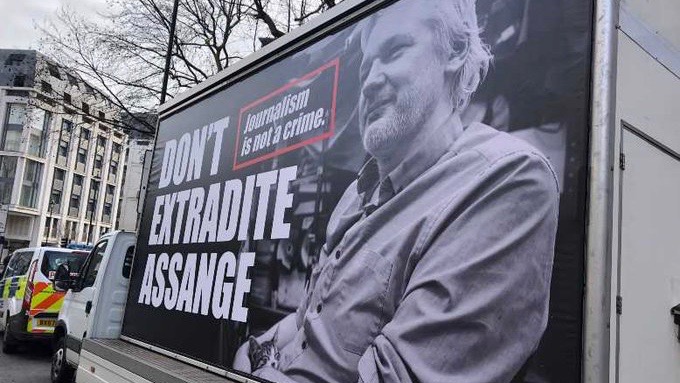The verdict in the extradition trial of WikiLeaks founder Julian Assange is set to be delivered on Monday, January 4 by a London court. Assange has been in jail since his arrest by the London Metropolitan Police on April 11, 2019 and as of December 2020, has spent nearly a decade in confinement in one form or the other.
On Monday, judge Vanessa Baraitser will decide whether Assange is to be extradited to the US to stand trial. Julian Assange faces 18 charges under the Espionage Act and the Computer Fraud and Abuse Act. If extradited and convicted in the United States, he could face a jail term of up to 175 years. The charges against Assange have to do with his work with whistleblower Chelsea Manning in exposing US war crimes and other atrocities in Iraq and Afghanistan. The extradition hearings began in February 2020 and concluded in October. We take a brief look at the uncomfortable truths that emerged from the prosecution process and what it tells us about the justice systems of both the US and the UK.
Indictment in the US and detention
Julian Assange was at the Ecuadorian Embassy in London from 2012, having received asylum from that country’s government. As early as November 2018, reports emerged that there was a secret grand jury being convened in the US to indict Assange. The revelation, a result of a “copy paste error” in court documents, also revealed a standing arrest warrant against him.
By March 2019, the concerns about the indictment became true after Chelsea Manning was ordered to testify against Assange and WikiLeaks by a federal grand jury. Her refusal to do so led to her incarceration and a hefty fine of USD 1000 a day.
In April that year, the Ecuadorian government under Lenin Moreno struck by revoking Assange’s asylum and handing him over to the London police.
Assange was arrested by the police on charges of jumping bail in 2012, in another extradition request from Sweden over a sexual harassment charge. In May, he was sentenced to 50 weeks of prison for violating the bail. In that same month, the US filed an extradition request against Assange detailing that he faced 17 charges under Espionage Act and one under the Computer Fraud and Abuse Act.
By November 2019, Swedish prosecutors dropped the sexual harassment investigation against him, leaving only the US extradition charge against him.
Hostile judicial and prison system
The defense team, along with international human rights groups and bodies, has consistently pointed out that UK courts have treated Assange with exceptional harshness. For instance, the initial 50-week jail sentence for jumping bail, passed by judge Deborah Taylor, was widely criticized with the UN Working Group on Arbitrary Detention calling it a “disproportionate sentence”.
In September 2019, judge Vanessa Baraitser decided to keep Assange in prison for what was effectively an indefinite period after he completed his bail violation sentence. This was under the reasoning that he was a flight risk.
Assange was shifted to the high-security prison in Belmarsh, near London, where he has been lodged since. This is despite the fact that Assange’s health condition inside the prison has seriously deteriorated. Even a report by UN special rapporteur on torture Nils Melzer, which stated that Assange had been exposed to psychological torture, and multiple letters by medical professionals from around the world raising concerns regarding his health did little to change the authorities’ minds.
Baraitser’s role in the process has been criticized by various observers. She dismissed Assange’s defense team’s pleas for extension to consider new developments, bail appeals or even complaints of lack of time to discuss the case with him because of restrictions by prison authorities. Baraitser also limited the number of observers or kept them out of the hearings. On the other hand, the prosecution team representing the US was given many concessions, and was even allowed last-minute submissions, leading to multiple delays in the trial process.
Trial exposed US justice system
Nevertheless, one of the biggest outcomes of the hearings was how the defense team exposed the holes in the case against Assange, as well as the intentions of the US in proceeding with the case.
Witnesses presented by the defense team spoke about major human rights violations by the US, the extremely political nature of the indictment, and how Assange is being punished for his role in exposing war crimes. Witnesses also asserted that a fair trial would be next to impossible under the Espionage Act, and also of the deplorable prison conditions for political prisoners that could make him a suicide risk.
The British justice system also overlooked threats to his life, with a major COVID-19 outbreak taking place in the Belmarsh prison where he is held. Despite him being identified as a high-risk inmate, with a history of respiratory diseases, the government and the prison authorities have refused to release him.
There has also been a global chorus for the release of Assange. Journalists, lawyers and political leaders are among those who have spoken out against the trial and called for his release. Despite the volume of evidence and concrete arguments presented by the defense, experts are apprehensive that the court will not stand up to US pressure. Regardless of the verdict, an appeals process which stretches for many months is likely. For supporters of freedom of expression around the world and for those who have been fighting imperialism, the struggle for the freedom of Julian Assange will continue.





